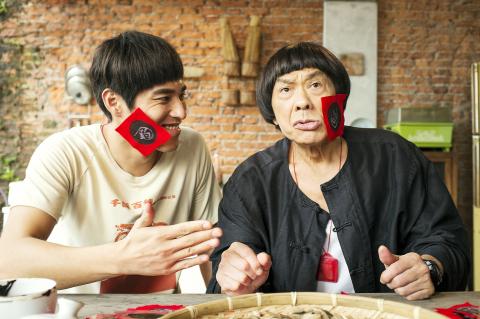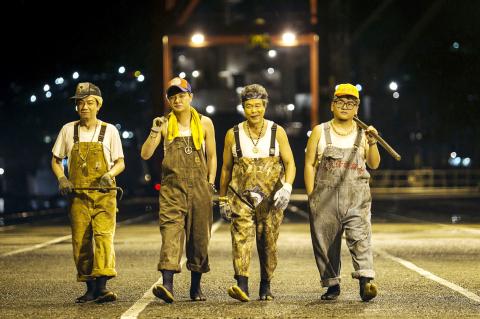If sappiness, melodramatics and exaggerated antics are staple features of Taiwanese commercial cinema, then 70-year-old Chu Ko Liang (豬哥亮) is its granddaddy. It seems just yesterday that Liang reemerged after keeping a low profile for more than a decade, but Hanky Panky (大釣哥) marks his sixth-straight Lunar New Year comedy — all massive box office successes. To be expected, the film is chock full of the aforementioned elements, and, of course, Liang’s trademark bathroom humor.
But the strange thing is that what would usually be cringe-worthy and outlandish makes total sense when Liang is in the mix. After all, he hails from a time where nonsensical comedies were still funny. All he has to do is be himself (or his usual stage persona) — the crass, inappropriate and over-the-top old man with the eternal bowl cut — and everything else seems to flow naturally. That said, Liang does rein in the weirdness for brief spurts and delivers a decent performance as a worried father whose son is about to be sentenced to death.
One might even complain that the film is tamer than expected, but Liang says he purposely created a more well-rounded character that is closer to his ideal of the “true Taiwanese man.” Liang says he has felt something missing in his previous films despite box office success, and decided to be more hands-on with Hanky Panky. Collaborating with former co-star Blue Lan (藍正龍), Liang reportedly spent three years coming up with the plot and setting before handing the reins to director Huang Chao-liang (黃朝亮), who directed Liang’s 2015 A Wonderful Wedding (大喜臨門).

Photo courtesy of Hualien Media
The result is nothing spectacular, and you’ll probably forget this movie once it’s over. But it isn’t a bad film for what it is: another solid and entertaining Liang-style comedy with a decent storyline and a surprising amount of chuckles, which is exactly what people are looking for in a holiday blockbuster. There’s even a somewhat clever twist at the end. But if you don’t understand Hoklo (also known as Taiwanese) or Mandarin, much of the humor will be lost in the subtitles. Even the Chinese film title is a pun, and god knows where they got “Hanky Panky” from.
There’s also a lot of pop culture-specific humor. For example, a scene where a female clerk at a sperm bank moves in slow motion will make no sense if you didn’t know that she is played by a guest actress whose claim to fame is imitating the DMV sloth clerk in Zootopia. What there isn’t in this movie, surprisingly, is swearing.
Liang plays Dadiao, a martial artist turned Chinese medicine practitioner who regularly commits petty theft with his son Hsiao-lung (Lan, also with a bowl cut). When Lan gets in trouble after borrowing money from his father’s enemy to send the love of his life (whom he just met) to law school, Liang must find a way to save him.

Photo courtesy of Hualien Media
Of course, the self-deprecating dirty old man gets no love in the film, and the romance falls to Hsiao-lung and Hsin-yi (Aggie Hsieh, 謝沛恩), who hold their own but lack Liang’s power of making the absurd seem normal. As a result, their scenes are mostly awkward and tacky.
Don’t dismiss Liang as a fool just because of his bumbling on-screen persona. There’s a reason he’s been able to stay relevant despite pulling the same old tricks decade after a decade. He knows how to tell a story, and most importantly, he knows how to make fun of himself — which is where most other Taiwanese screwball comedies fall short.

May 11 to May 18 The original Taichung Railway Station was long thought to have been completely razed. Opening on May 15, 1905, the one-story wooden structure soon outgrew its purpose and was replaced in 1917 by a grandiose, Western-style station. During construction on the third-generation station in 2017, workers discovered the service pit for the original station’s locomotive depot. A year later, a small wooden building on site was determined by historians to be the first stationmaster’s office, built around 1908. With these findings, the Taichung Railway Station Cultural Park now boasts that it has

Wooden houses wedged between concrete, crumbling brick facades with roofs gaping to the sky, and tiled art deco buildings down narrow alleyways: Taichung Central District’s (中區) aging architecture reveals both the allure and reality of the old downtown. From Indigenous settlement to capital under Qing Dynasty rule through to Japanese colonization, Taichung’s Central District holds a long and layered history. The bygone beauty of its streets once earned it the nickname “Little Kyoto.” Since the late eighties, however, the shifting of economic and government centers westward signaled a gradual decline in the area’s evolving fortunes. With the regeneration of the once

The latest Formosa poll released at the end of last month shows confidence in President William Lai (賴清德) plunged 8.1 percent, while satisfaction with the Lai administration fared worse with a drop of 8.5 percent. Those lacking confidence in Lai jumped by 6 percent and dissatisfaction in his administration spiked up 6.7 percent. Confidence in Lai is still strong at 48.6 percent, compared to 43 percent lacking confidence — but this is his worst result overall since he took office. For the first time, dissatisfaction with his administration surpassed satisfaction, 47.3 to 47.1 percent. Though statistically a tie, for most

In February of this year the Taipei Times reported on the visit of Lienchiang County Commissioner Wang Chung-ming (王忠銘) of the Chinese Nationalist Party (KMT) and a delegation to a lantern festival in Fuzhou’s Mawei District in Fujian Province. “Today, Mawei and Matsu jointly marked the lantern festival,” Wang was quoted as saying, adding that both sides “being of one people,” is a cause for joy. Wang was passing around a common claim of officials of the People’s Republic of China (PRC) and the PRC’s allies and supporters in Taiwan — KMT and the Taiwan People’s Party — and elsewhere: Taiwan and